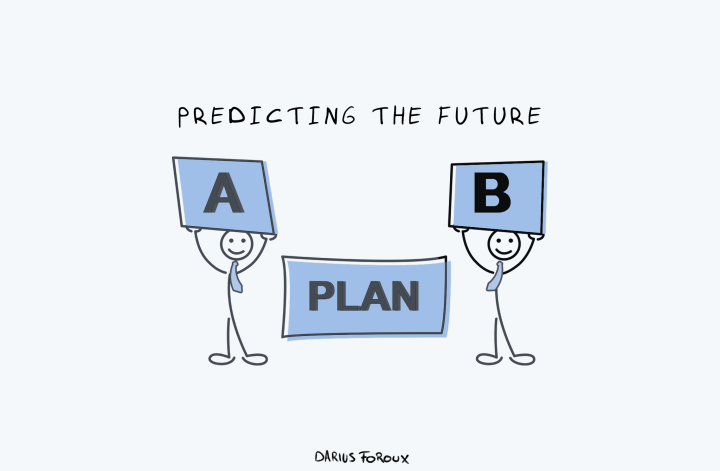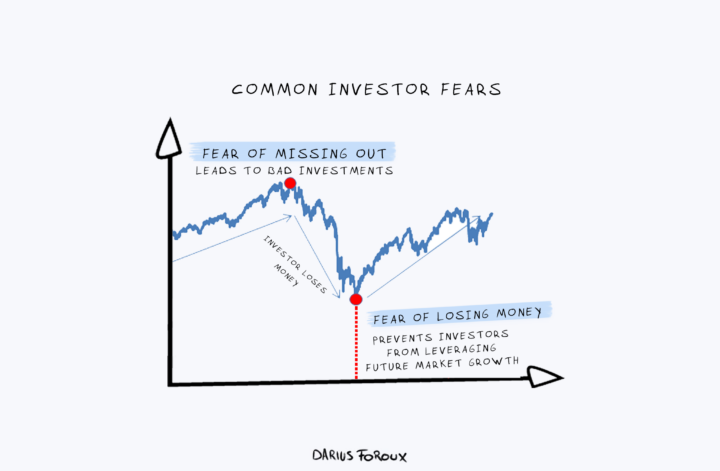“Have we ever made an emotional decision?” Warren Buffett asked his long-time business partner and friend, Charlie Munger, at the 2023 Berkshire Hathaway annual shareholder’s meeting. Being emotional with money is common with most people, after all.
Munger, as dry as he always is, answered without thinking1Source: YouTube:
“NO.”
Buffett said that he had never made an emotional investment decision in his life. And Munger agreed.
This was my favorite takeaway from their annual meeting. And it doesn’t come as a surprise. Buffett and Munger are famous for their rational decision-making.
When it comes to financial decisions, we must act like robots. We can’t let emotions get in the way.
The question is: Can you learn how to remove emotions from your decision-making process?
In my experience, the answer is yes. I’ve always been very emotional when it came to my investment decisions.
Like most stock market investors, I was either too greedy or too fearful. When I saw an opportunity I invested too much money and got obsessed with the outcome. Then, when it didn’t work out in the short term, I would get scared and sell.
Let me share two things I’ve learned from observing Warren Buffett about removing emotional money decisions.
1. Future returns is the name of the game
Buffett has achieved an average annual return of 20% since 1965 with Berkshire.2Source: Yahoo Finance Before that, he had a partnership he started in 1957.
With that partnership, he averaged 31% and had no losing years.3Source: Novel Investor
What I’ve noticed is that Buffett always talks about money in future terms. For instance, if you want to buy a $1,000 iPhone, you’re actually paying $2,488.32 for the device.
Buffett always believes he’s able to compound his money at least with a 20% annual return. If you invest that $1k for 5 years at 20%, you end up with $2,488.32.
This is one of the most important lessons I’ve learned from Buffett. You always have the option to invest with every spare dollar you have.
If you spend that money on objects or services, that money is gone. You must always keep in mind that you have another option. You could’ve invested that money.
Because I’m not Buffett, I always think about the option of compounding my money at 10% in the stock market. If I want to make a purchase, I quickly multiply it by 1.5 in my mind.
That’s because 10% a year over 5 years on every dollar gives you $61 cents of return.
The price of the thousand-dollar iPhone is actually $1600. I should technically multiply it by 1.6, but since I’m not good at doing math in my mind, I use 1.5.
I do it with everything. If I look at something that’s $300, I think, “50% of 300 is 150, so this thing is actually $450.”
Is that worth it? Or should I just invest my money in the market?
This thought exercise forces you to think about the math behind your spending. It turns your financial behavior into a rational process.
2. Keep your expenses low
Look at some of the frugal things Buffett does:
- He buys a new car roughly every 7 to 8 years
- He’s living in the same house since 1958 (he was 28 when he bought his house)
- He was born in Omaha, which is not an expensive city,4Source: Omaha Share Location and lived there his entire life (except for brief stints in Washington and New York when he was young)
- His company has been in the same office building for 56 years and only has a staff of 25 people5Source: Yahoo Finance
Buffett is currently worth 113 billion dollars.6Source: MoneyWise He has always lived a simple life. He loves his work, which is also his hobby. Here are some of his other hobbies:
- Playing bridge: He plays up to 8 hours a week.
- Playing the ukulele: He started in college and even performed a duet with singer-songwriter Paul Anka at a Berkshire Hathaway shareholder meeting.
- Collecting stamps: Buffett has been interested in collecting stamps since childhood and has amassed a large collection over the years.
- Reading: He’s a voracious reader and has credited his success to investing in his habit of reading for hours every day. He reportedly reads several newspapers a day and has been known to read up to 500 pages a day.
These hobbies don’t cost much and are simple.
Here’s my takeaway from his simple life: Buffett’s lifestyle keeps him grounded. Because he loves his work so much, he doesn’t have the desire to fill his life with other things.
What costs the most in life? Big houses, vacations, cars, designer clothing, jewelry, luxury watches.
Another thing that drains your bank account is living in popular places. You pay a premium for living in desirable places like LA, Miami, NYC, London, Paris, Dubai, and so forth.
Buffett has literally 0 of that in his life. He lives a simple life in a simple city.
Think about it: When you have a peaceful life, you have mental peace too. That means less emotional ups and downs. That means you’re setting yourself up to make rational and level-headed decisions in your life.
Emotions are good, just not with your money
Buffett nuanced his statement on not making emotional investment decisions:
“You don’t want to be a no-emotion person in all of your life. You definitely want to be a no-emotion person making an investment or business decision.”
I’m a firm believer that your lifestyle influences your emotions more than most people acknowledge.
If you have a stressful job and live in an expensive city and you spend all your money so you can be fashionable, how can you ever expect to be grounded?
I’ve seen this with myself too. When I lived in London I was just a more agitated person. The city moves fast, which subconsciously impacted me. I had to keep up.
Last year I spent four months in Marbella, Spain. It’s an odd place. I went for the weather and scenery. But all I saw were luxury cars and people with expensive clothes.
If you’re surrounded by that environment, you get pulled into that energy. Or, you get repelled by it, which is what happened to me. I prefer to be surrounded by normal people in a normal city.
A normal life helps me to focus on the things I truly enjoy. And that in turn calms me down, which helps me to do a better job and enjoy my life even more.
Money, emotions, life. All these things are connected. If you get the balance right, everything will work out well for you. If you don’t, everything can work against you.
So fix your lifestyle and everything else will follow.




